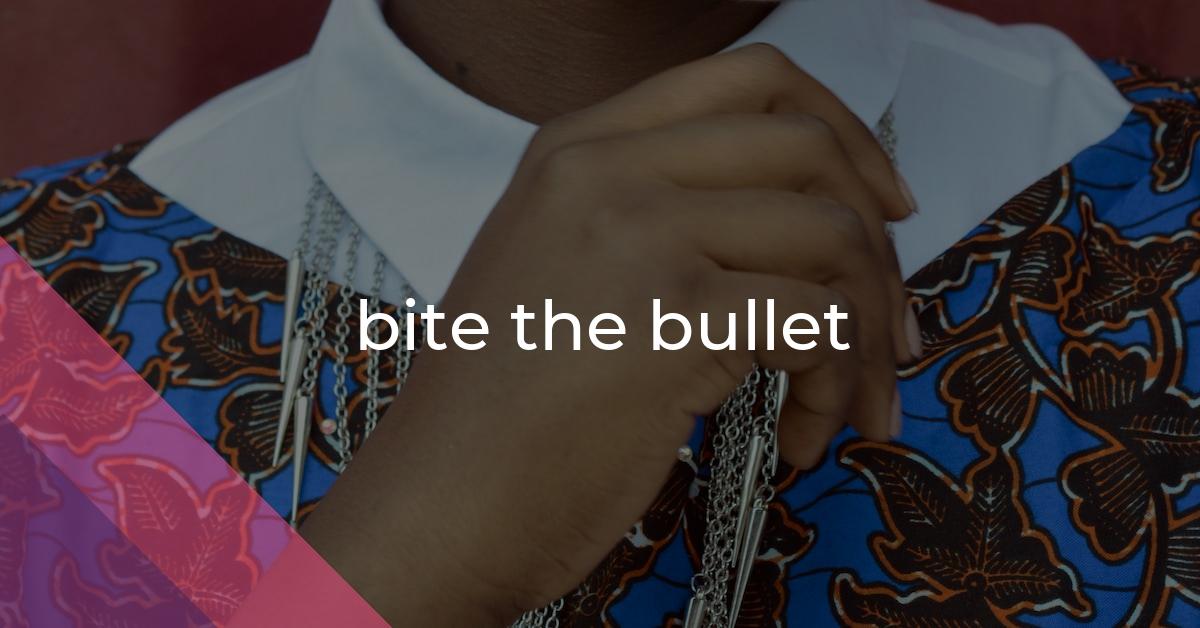bite the bullet: Idiom Meaning and Origin
What does ‘bite the bullet’ mean?
The idiom "bite the bullet" means to endure a difficult or unpleasant situation with courage or determination.

Idiom Explorer
The idiom "hang tough" means to persevere or remain determined in difficult or challenging situations. It conveys the idea of not giving up or wavering in the face of adversity.
The idiom "grow some balls" means to have courage or become more assertive when facing a challenge or making a decision.
"Grit one's teeth" means to show determination or bravery in the face of a difficult or painful situation. It often implies enduring discomfort or pain while trying to remain strong or determined.
The idiom "grab the bull by the horns" means to confront a difficult situation directly with courage and determination, rather than avoiding or ignoring it.
The idiom "eat it" means to accept or tolerate something unpleasant or embarrassing, often with resignation or humility.
The idiom "eat an elephant one bite at a time" means tackling a large or overwhelming task by breaking it down into smaller, more manageable parts.
The idiom "do it tough" means to face or endure a difficult or challenging situation with determination and resilience.
The idiom "dodge a bullet" means to narrowly escape a dangerous or undesirable situation or consequence.
The Resolved Pain:
The idiom bite the bullet originated in the late 19th century in the United States and is derived from practices in military medicine. During surgical procedures, patients were given bullets to clench between their teeth in order to endure the pain without biting down on wooden wedges, which could cause further harm.
Figuratively, bite the bullet means to face a difficult or unpleasant situation with courage and determination. It implies the willingness to endure hardship or pain in order to achieve a desired outcome or resolve a problem. The idiom suggests a stoic acceptance of the situation and an acknowledgement that there is no easy way out.
The use of bullets as makeshift tools in lieu of anesthesia during warfare demonstrates the origin of this idiom. Surgeons gave patients bullets to bite down on not only to distract them from the pain, but also to prevent them from screaming and alerting others to their location. This practice highlights the harsh conditions and limited resources during times of conflict.
The phrase bite the bullet gained wider popularity in the United States after the publication of Rudyard Kipling's novel "The Light that Failed" in 1891. In the novel, an artist named Dick Heldar is injured in battle and must undergo surgery. Kipling vividly describes the scene, using the phrase "bite on the bullet" to convey the protagonist's physical and emotional endurance during the procedure.
Over time, this idiom has become a common expression used to describe the act of facing difficult situations head-on. It emphasizes the need to accept the discomfort or pain that comes with it as an unavoidable part of the process. It is often used in discussions about personal resilience, perseverance, and the ability to confront adversity.
The idiom bite the bullet serves as a reminder of the sacrifices and hardships endured throughout history, particularly in times of conflict. It encapsulates the idea that sometimes tough choices need to be made and the consequences must be borne, even when they are painful or difficult. This idiom continues to be relevant today, symbolizing the grit and determination needed to navigate challenging circumstances and make difficult decisions in everyday life.
The idiom bite the biscuit is related to bite the bullet. It is a variation of the original phrase and is used in similar contexts. Just like biting the bullet, biting the biscuit means facing a difficult situation with bravery and resilience. The phrase highlights the willingness to endure hardship or pain in order to achieve a desired outcome or resolve a problem.
The idiom bite off is also related to bite the bullet. It means to take on a difficult, challenging, or complex task or situation. When someone "bites off more than they can chew," they have taken on more responsibility or commitment than they can handle. It can also mean willingly accepting a great challenge or risk, similar to biting the bullet.
Another related idiom is bite the big one. This phrase is a slang term that means to accept an unpleasant or undesirable outcome or circumstance. It often implies resignation or acceptance. Biting the big one is similar to biting the bullet in the sense that it involves facing a difficult situation without resistance or complaint.
The idiom eat it is also related to biting the bullet. When someone is told to "eat it," it means they are being instructed to accept a difficult or unpleasant situation without resistance or complaint. It is often used in a confrontational or dismissive manner, implying that the person should simply endure the situation and move on.
Another related idiom is do it tough, which means to endure or persevere through difficult or challenging circumstances. Similar to biting the bullet, doing it tough implies accepting the hardships or pain that come with a particular situation and facing it with fortitude and resilience.
Example usage
Examples of how the idiom "bite the bullet" can be used in sentences:
- John knew surgery was his only option, so he decided to bite the bullet and schedule the procedure.
- After losing his job, Mark had to bite the bullet and start working at a minimum-wage job to make ends meet.
- Despite the pain, Sarah decided to bite the bullet and confront her friend about the betraya.
More "Courage" idioms



